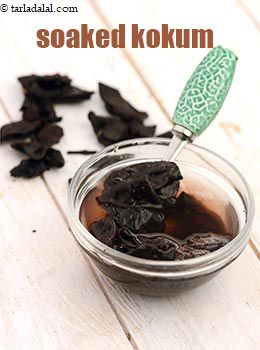Kokum has has been known as Grandma’s cure to acidity. It primarily grows in the Western Ghats, especially the Goa and Konkan region. It is a small fruit like cherry tomato which is red in colour and deepens to purple on ripening. While this fresh variety is available, its dried variety made after drying the ripened fruit is commonly sold and has culinary uses too. It has a sour taste with a faintly sweet aroma.
The sun-dried version is called aamsul, kokum or kokam, and is used mainly in Maharashtrian, Konkan and Gujarati cuisine. When added to food it imparts a pink to purple colour and sweet/sour taste. It is a preferred substitute for tamarind in curries and other dishes.
![]()
Also known asCocum, Dried Kokum
Soaked kokum

Semi-dried kokum needs to be soaked in water to extract the pulp, which is added to foods to impart a sour flavour. The process is similar to that used to extract tamarind pulp from dried tamarind.
How to select Kokum, Dried Kokum• Similar to tamarind, kokum is usually available as dried rind or fruit.
• Look for a deep colour. Deeper the colour, better the kokum.
• If buying from bulk bins, make sure it is covered appropriately to prevent dust and debris from settling on it.
• Smell it slightly if possible. It should not have any tell-tale smell of spoilage (which could indicate the kokum was not dried properly before selling.
Culinary Uses of Kokum, Dried Kokum in Indian Cooking
We show you how to use kokum in some dals and kadhi recipes. Kokum is used in Gujarati dal recipe to give the ideal balance of sweet and sour taste.
What an exciting flavour this
Kokum Kadhi has. Indeed, the best of homely flavours, tanginess, is the highlight of this recipe.
Indian drinks using kokum is very popular. While Kokum Sherbet mixes are easily available in the market, nothing can beat the taste, pulpy texture and pristine aroma of this fresh and natural Kokum Sherbet, prepared in your own kitchen.
Kokum used in Maharashtrian cooking and mainly in the konkan belt. They use kokum as a substitute for Imli. Even in bhindi sabzi the Kokani people use kokum.
Maharashtrian dal usal is made by cooking field beans with a traditional tempering, tangy kokum and everyday spices.
• It is used mainly in the regional cuisines of Gujarat, Maharashtra and other places of the Konkan coast.
• In Goa, Maharashtra, and other nearby states, large glasses of kokum sherbet are served in the summer months to beat the heat.
• Kokum has the same souring qualities as tamarind, especially enhancing coconut-based curries, dals, and vegetable dishes involving potatoes, okra, etc.
• It is also included in chutneys and pickles. When doing so, the skins are not usually chopped but are added whole to the dish. Seasoning should be checked as they are quite salty. Beware of biting on a stone as a few are often left in the skins.
How to store Kokum, Dried Kokum• You can store dried kokum in an airtight container for about a year.
Health benefits of Kokum, Dried KokumKokum (Gracinia Indica) has been known as Grandma’s cure to acidity. The hydroxycitric acid – a compound found in kokum has been known to reduce cholesterol levels and suppress appetite, thus working towards controlling obesity and maintain a heathy heart. Kokum’s powerful component ‘garcinol’ carries the antioxidant properties. Try this kokum kadhi recipe. Research on kokum and diabetes is not clear, so best to try and avoid it. See the detailed benefits of kokum.